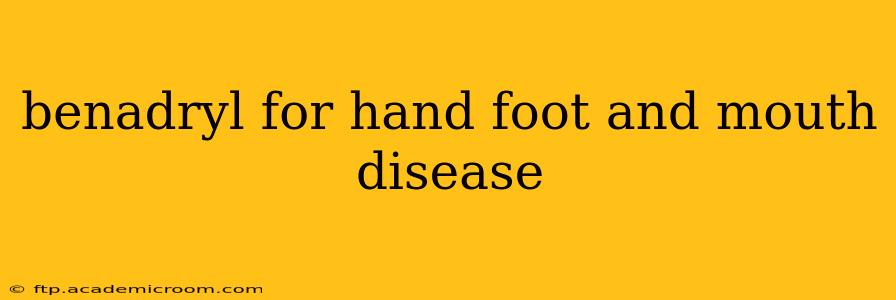Hand, foot, and mouth disease (HFMD) is a common viral infection that primarily affects young children. Characterized by painful sores in the mouth and a rash on the hands and feet, it can be incredibly uncomfortable for sufferers. Many parents naturally seek ways to alleviate their child's symptoms, and Benadryl (diphenhydramine) often comes up as a potential solution. But does it actually help with HFMD? Let's explore.
What is Hand, Foot, and Mouth Disease?
Before delving into Benadryl's role, it's crucial to understand HFMD. Caused by various viruses, most commonly Coxsackievirus A16 and Enterovirus 71, HFMD typically presents with:
- Fever: Often the first symptom.
- Sore throat: Making it difficult to swallow.
- Mouth sores: Painful blisters or ulcers inside the mouth, on the tongue, and gums.
- Rash: A characteristic rash appears on the hands, feet, and sometimes the buttocks and knees. These may be small, flat, or slightly raised blisters.
The illness is usually self-limiting, meaning it resolves on its own within 7-10 days.
Does Benadryl Help with Hand, Foot, and Mouth Disease Symptoms?
The short answer is: Benadryl is not a treatment for HFMD itself. It won't cure the viral infection. However, it might offer temporary relief from some symptoms.
Benadryl is an antihistamine, primarily used to treat allergies. Its effects include:
- Reducing itching: While HFMD doesn't typically cause intense itching, Benadryl could offer minimal relief from any itching associated with the rash.
- Drowsiness: This can be beneficial for children experiencing discomfort and difficulty sleeping due to pain and fever.
Important Note: While some parents might find Benadryl helpful for managing sleep disruption or mild itching, it's not a substitute for proper medical care.
What About Fever Reduction?
Fever is a common symptom of HFMD. While Benadryl has some sedative properties, it's not an effective fever reducer. Acetaminophen (Tylenol) or ibuprofen (Advil/Motrin) are much better choices for managing fever in children. Always follow the recommended dosage for your child's age and weight. Consult your pediatrician before administering any medication to your child.
Can I use Benadryl for my baby with HFMD?
Using Benadryl for infants and very young children should only be done under the strict guidance of a pediatrician. The dosage is crucial, and there can be side effects. Never self-medicate a baby or young child.
What are the best ways to manage HFMD symptoms?
The best approach to HFMD is supportive care, which focuses on alleviating symptoms:
- Pain relief: Use acetaminophen or ibuprofen as directed by your doctor for fever and pain.
- Hydration: Ensure your child drinks plenty of fluids to prevent dehydration. Offer cool liquids like water, broth, and popsicles. Avoid acidic juices.
- Soft foods: Serve soft, bland foods that are easy to swallow, such as applesauce, yogurt, or mashed potatoes.
- Oral care: Gently clean your child's mouth with cool water or a soft cloth. Avoid harsh mouthwashes.
- Rest: Encourage plenty of rest.
When should I seek medical attention for HFMD?
Most cases of HFMD resolve without complications, but seek medical attention if your child:
- Has difficulty breathing.
- Shows signs of dehydration (decreased urination, dry mouth).
- Develops a high fever that doesn't respond to medication.
- Experiences excessive lethargy or irritability.
- Has severe mouth sores that prevent them from eating or drinking.
In conclusion, while Benadryl might provide marginal relief from itching and promote sleep in some children with HFMD, it's not a treatment for the infection itself. Focus on supportive care, and always consult your pediatrician before administering any medication to your child, especially if they are an infant or very young child. Prioritizing hydration, pain relief, and rest is key to managing HFMD.
